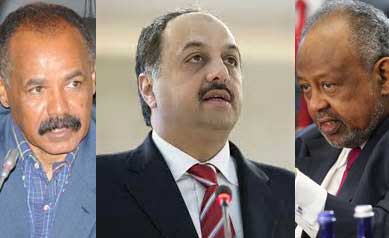Security Council Extends Mandate Of Monitoring Group On Eritrea
Condemning the continuing flow of “weapons and ammunition supplies to and through Somalia and Eritrea”, the Security Council has extended the mandate of the Monitoring Group on Somalia and Eritrea for 13 months—through August 25, 2013—directing all Member States “including Eritrea” to co-operate with the Monitoring Group and instructing the Secretary General to make the “necessary financial arrangements to support the work of the Monitoring Group.”
The resolution (2060) was passed on July 25, 2012 after the Security Council convened for 10 minutes.
The Security Council, which also condemned the serial deadline violation of the Somalia government, insisted that the Somalia transition will not extend beyond August 20, 2012.
The Eritrean government, through its envoy to the UN, has alternated between casting aspersions on the objectivity of the Monitoring Group and demanding that its co-ordinator be “fired” while, at the same time, using the report of the Monitoring Group to prove that it no longer has any role in Somalia and that the sanctions should be lifted.
While the mandate of the Monitoring Group is relaxed with respect to some areas being monitored in Somalia, its mandate on Eritrea will remain unchanged.
Characterizing the Eritrean government’s behavior in Somalia and Djibouti as a “threat to international peace and security in the region”, the Security Council has directed the Monitoring Group to “investigate, in coordination with relevant international agencies, all activities, including in the financial, maritime and other sectors, which generate revenues used to commit violations of the Somalia and Eritrea arms embargoes.”
This mandate has empowered, and will continue to empower, the Monitoring Group to investigate the Eritrean government’s practice of raising funds, through extortion, by the 2% tax it imposes on Eritreans in Diaspora; its contraband trade, as well as its arms and human trafficking campaigns which have been reported in great detail by the Monitoring Group.
The report of the Monitoring Group, which has now been made public today, was excerpted by awate.com on July 20, 2012. The report includes testimonies from Eritrean victims of human trafficking in Egypt who have been victimized by Egyptian Bedouin tribes and who assert that a senior Eritrean official, General Tekle “Manjus” Kiflay is behind the arms and human trafficking.
With respect to the so-called 2% “rehabilitation tax”, the Monitoring Group has compiled evidence that it is not, as the Eritrean government claims, voluntary but collected through threats and intimidation. The Canadian government has already disclosed that it is considering all options to reduce the Eritrean governments bullying activities on the Eritrean Diaspora, including closing the Eritrean consulate in Canada.
//END
awate.com
inform. inspire. embolden. reconcile


Awate Forum